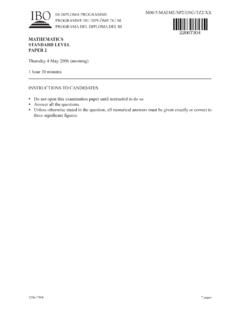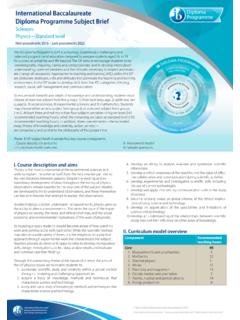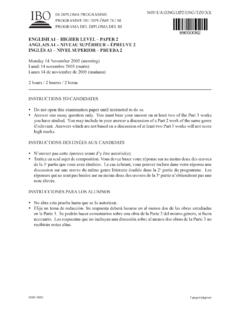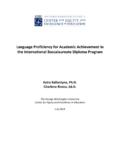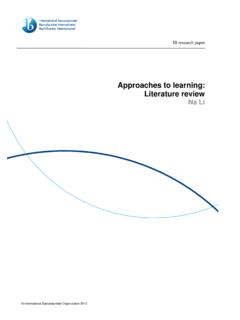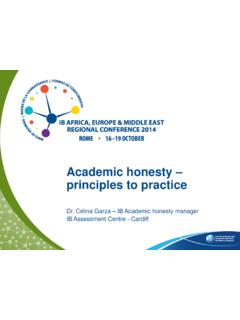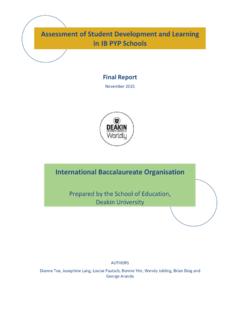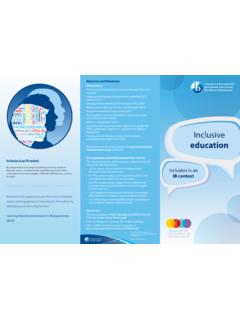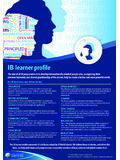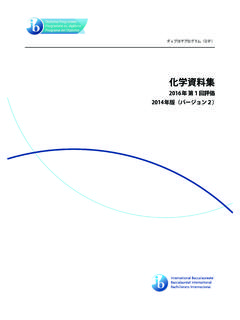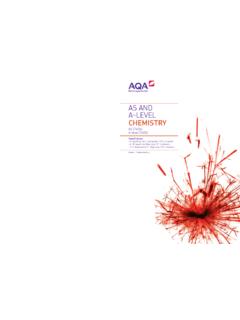Transcription of International Baccalaureate Diploma Programme Subject …
1 International Baccalaureate Diploma Programme Subject Brief Diploma Programme core: Theory of knowledge First assessments 2015 Last assessments 2021. The IB Diploma Programme (DP) is a rigorous, academically challenging and bal- anced Programme of education designed to prepare students aged 16 to 19 for success at university and life beyond. The DP aims to encourage students to be knowledgeable, inquiring, caring and compassionate, and to develop intercultural understanding, open-mindedness and the attitudes necessary to respect and evalu- ate a range of viewpoints. To ensure both breadth and depth of knowledge and understanding, students must choose at least one Subject from five groups: 1) their best language, 2) additional lan- guage(s), 3) social sciences, 4) experimental sciences, and 5) mathematics.
2 Students may choose either an arts Subject from group 6, or a second Subject from groups 1 to 5. At least three and not more than four subjects are taken at higher level (240. recommended teaching hours), while the remaining are taken at standard level (150. recommended teaching hours). In addition, three core elements the extended es- say, theory of knowledge and creativity, action, service are compulsory and central to the philosophy of the Programme . These IB DP Subject briefs illustrate four key course components. I. Course description and aims III. Assessment model II. Curriculum model overview IV. Sample questions I. Course description and aims II. Curriculum model overview Theory of knowledge (TOK) is a course about critical thinking and in- Component quiring into the process of knowing, rather than about learning a spe- cific body of knowledge.
3 It plays a special role in the DP by providing Knowing about knowing an opportunity for students to reflect on the nature of knowledge, to TOK examines how we know what we claim to know, by encouraging make connections between areas of knowledge and to become aware students to analyse knowledge claims and explore knowledge ques- of their own perspectives and those of the various groups whose knowl- tions. A knowledge claim is the assertion that I/we know X or I/we edge they share. It is a core element undertaken by all DP students, and know how to Y , or a statement about knowledge; a knowledge ques- schools are required to devote at least 100 hours of class time to the tion is an open question about knowledge.
4 The distinction between course. The overall aim of TOK is to encourage students to formulate an- shared knowledge and personal knowledge is intended to help teach- swers to the question how do you know? in a variety of contexts, and to ers construct their TOK course and to help students explore the nature see the value of that question. This allows students to develop an endur- of knowledge. ing fascination with the richness of knowledge. Ways of knowing The aims of the TOK course are to: While there are arguably many ways of knowing (WOKs), TOK iden- tifies eight specific WOKs: language, sense perception, emotion, rea- make connections between a critical approach to the construction son, imagination, faith, intuition, and memory.
5 Students must explore of knowledge, the academic disciplines and the wider world a range of ways of knowing, and it is suggested to study four of these develop an awareness of how individuals and communities con- in depth. struct knowledge and how this is critically examined Areas of knowledge develop an interest in the diversity and richness of cultural per- Areas of knowledge are specific branches of knowledge, each of spectives and an awareness of personal and ideological assump- which can be seen to have a distinct nature and different methods of tions gaining knowledge. TOK distinguishes between eight areas of knowl- critically reflect on their own beliefs and assumptions, leading to edge: mathematics, the natural sciences, the human sciences, the arts, more thoughtful, responsible and purposeful lives history, ethics, religious knowledge systems, and indigenous knowl- understand that knowledge brings responsibility which leads to edge systems.
6 Students must explore a range of areas of knowledge, commitment and action. and it is suggested to study six of these eight. International Baccalaureate Organization 2014. International Baccalaureate | Baccalaur at International | Bachillerato Internacional . III. Assessment model IV. Sample prescribed titles Having followed the TOK course, students will be expected to Using history and at least one other area of knowledge, examine demonstrate the following: the claim that it is possible to attain knowledge despite problems of bias and selection. Identify and analyse the various kinds of justifications used to It is a capital mistake to theorize before one has data. Insensibly support knowledge claims.
7 One begins to twist facts to suit theories, instead of theories to Formulate, evaluate and attempt to answer knowledge questions. suit facts (Arthur Conan Doyle). Consider the extent to which this Examine how academic disciplines/areas of knowledge generate statement may be true in two or more areas of knowledge. and shape knowledge. In what ways may disagreement aid the pursuit of knowledge in Understand the roles played by ways of knowing in the construc- the natural and human sciences? tion of shared and personal knowledge. Explore links between knowledge claims, knowledge questions, ways of knowing and areas of knowledge. Demonstrate an awareness and understanding of different perspectives and be able to relate these to one's own perspective.
8 Explore a real-life/contemporary situation from a TOK perspective in the presentation. Assessment at a glance Type of Format of Weighting of assessment assessment final grade (%). External Part I: One essay on a title chosen from 67. Essay on a a list of six prescribed titles. prescribed title Internal Part 2: One presentation to the class by 33. Presentation an individual or a group (max of three persons); approximately 10 minutes per student. One written presentation planning document for each student. TOK contributes to the overall Diploma score through the award of points in conjunction with the extended essay. A maximum of three points are awarded according to a student's combined performance in both TOK and the extended essay.
9 About the IB: For over 40 years the IB has built a reputation for high-quality, challenging programmes of education that develop internationally minded young people who are well prepared for the challenges of life in the 21st century and able to contribute to creating a better, more peaceful world. For further information on the IB Diploma Programme , visit: Complete Subject guides can be accessed through the IB Online Curriculum Center (OCC), the IB university and government official system, or purchased through the IB store: To learn more about how the IB Diploma Programme prepares students for success at university, visit: or email.
